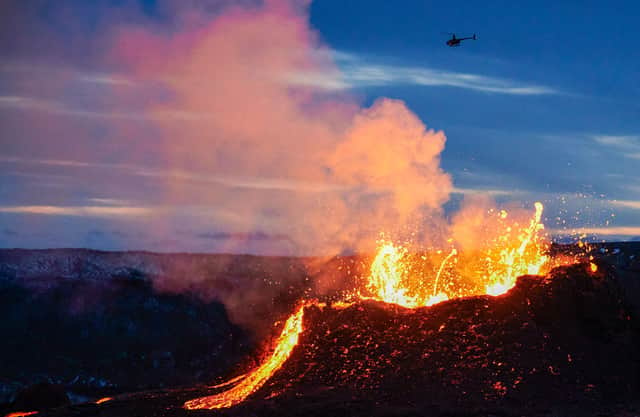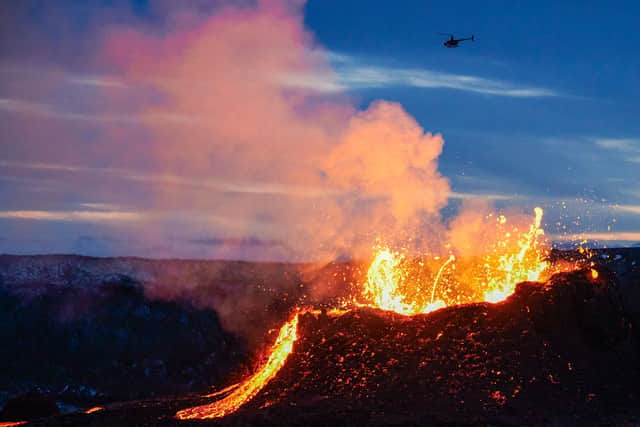Volcano Iceland 2023: Latest Foreign Office travel advice, is an earthquake likely - are flights cancelled?


The Foreign Office has warned those who are planning to travel to Iceland as it is “increasingly possible” that a volcanic eruption could occur. Icelandic authorities are continuing to monitor the situation as earthquakes and indications of volcanic activity have increased above normal levels on the Reykjanes peninsula, southwest of Reykjavik.
Hundreds of small earthquakes have rocked the Reykjanes Peninsula, the island nation’s most populated region, for more than two weeks. The Foreign Office said authorities are particularly monitoring the area northwest of Mt Thorbjörn near the Svartsengi power plant and the Blue Lagoon. Iceland is one of the most geographically active regions in the world. The island nation counts around 30 active volcanic sites.
Advertisement
Hide AdAdvertisement
Hide AdOn 10 November, a Civil Protection Alert was declared after the intense swarm of earthquakes. The town of Grindavík was evacuated as a precaution with roads closed and visitors are advised to stay away from the area.
Here’s everything you need to know if you are planning to travel to Iceland including what the latest Foreign Office advice is and the likelihood of a volcanic eruption. You will also find information about whether flights to and from the island are disrupted.
What is the latest travel advice from the Foreign Office?
On its website the Foreign Office says: “While there is no current eruption, it is increasingly possible that one could occur. You should monitor local media for updates and follow the authorities advice on travel to the area.”
It advises travellers to check for alerts and advice from the following:
Advertisement
Hide AdAdvertisement
Hide AdIreland’s Department of Foreign Affairs similarly prohibits travel to the town and warns that “visitors to Iceland must follow the directions and guidance of the local authorities at all times.” However, neither government has not issued a ‘no-go’ travel warning for Iceland meaning that airlines and holiday companies are operating as normal and travellers who cancel have no automatic right to a refund.


Is there going to be a volcanic eruption in Iceland?
Iceland’s seismic activity began in an area north of Grindavik which was evacuated on Saturday 11 November. A geology professor Pall Einarrson told Iceland's RUV that in this area a magma corridor beneath the surface is already around 10 kilometres long and spreading.
He said: "The biggest earthquakes originated there, under this old series of craters, but since then [the magma corridor] has been getting longer, went under the urban area in Grindavík and is heading even further and towards the sea.”
Are flights to Iceland cancelled?
Iceland’s authorities have raised their aviation alert to orange, indicating an increased risk of a volcanic eruption. Volcanic eruptions can pose a serious hazard to air travel as ash released into the atmosphere can cause jet engines to fail, damage flight control systems and reduce visibility.
Advertisement
Hide AdAdvertisement
Hide AdHowever, at the moment flights are still operating as normal to the nearby Keflavik International Airport and there haven’t been cancellations or significant delays. A spokesperson for easyJet told the Independent: “Our flying schedule is currently operating as normal however we are monitoring the situation closely and should this change we will contact customers directly to advise on their flights.” The Foreign Office also confirmed that flights to and from Keflavik International Airport are “operating as normal”.
Is the Blue Lagoon open?
The heightened geological activity has led to the Blue Lagoon geothermal spa, one of Iceland’s biggest tourist attractions, being closed temporarily until 16 November. It is concentrated in the southwestern Reykjanes Peninsula, which was dormant for 800 years before a 2021 eruption.
The Icelandic Met Office said that magma was accumulating at a depth of around 5km (3m) northwest of Thorbjorn mountain. The Blue Lagoon is easily visible from the mountain and so owners have closed the site.
Comment Guidelines
National World encourages reader discussion on our stories. User feedback, insights and back-and-forth exchanges add a rich layer of context to reporting. Please review our Community Guidelines before commenting.
